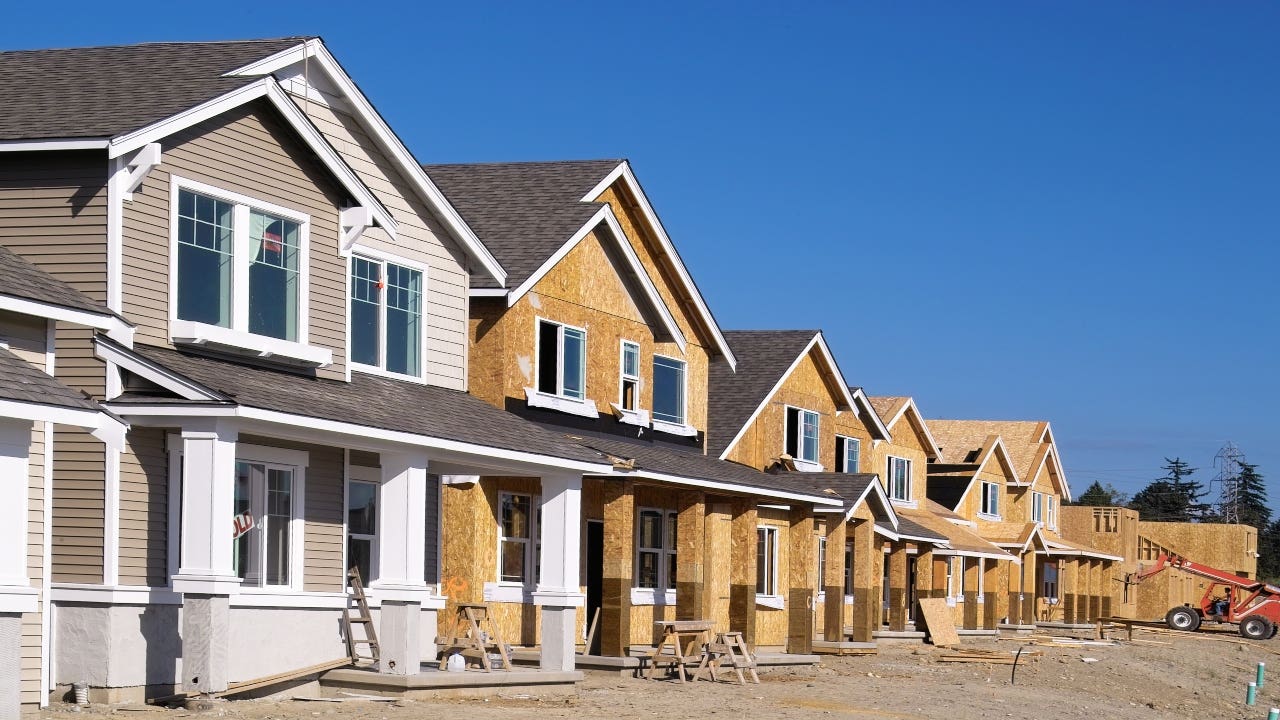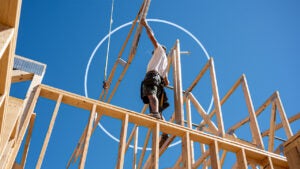Should I buy a house or build one?




Key takeaways
- The purchase price of a completed new-construction home tends to be higher than that of an existing home.
- The cost to build a home from scratch can be cheaper, but a lot depends on labor costs and the home's size and finishes.
- Building a home from the ground up can be financed, but not with a traditional mortgage — you'd need a construction loan, which works differently.
Building a home rather than buying one has its advantages, such as allowing you to customize it to your needs. However, the median sale price of a new-construction home in March 2024 was $430,700, according to data from the U.S. Census Bureau. That’s a fair bit more expensive than the median sale price of an existing home during the same month, which according to the National Association of Realtors was $393,500.
But determining whether it’s more expensive to build a house from scratch or buy an existing one can be complicated. Existing homes are in short supply right now. And for new construction, a lot depends on the cost of base materials like lumber, labor costs, the home’s size and which finishes you choose. Inflation can also impact your bottom line. Here’s what to consider if you’re debating whether you should build or buy a house in today’s market.
Homebuying and building statistics
- Median sale price of an existing home in March 2024: $393,500
- Median sale price of a new-construction home in March 2024: $430,700
- Average cost to build a house from scratch: $313,069
- Labor costs for a new build: 40 percent of overall project
- Materials cost for a new build: 60 percent of overall project
- Cost of a building permit: $150 to $2,000, depending on home size and local laws
SOURCES: National Association of Realtors, U.S. Census Bureau, Angi
Costs of building a home
The costs of building a home include labor, supplies, permits, architectural plans and inspections. You can cut down on expenses if you do some of the work yourself and select less expensive materials. Overall, the cost of building a home is largely contingent on how much you choose to spend on each component of the project.
| Construction cost | Price range |
|---|---|
| SOURCE: Angi | |
| Buying land | $3,000–$150,000 |
| Prepping land | $1,500–$5,600 |
| Framing | $20,000–$50,000 |
| Plumbing | $7,500–$15,000 |
| Electrical wiring | $10,000 |
| HVAC | $7,500 |
| Foundation | $5,100–$19,400 |
| Roofing | $11,728–$23,931 |
| Windows | $575–$1,475 per window |
| Exterior painting | $1,810–$4,509 |
| Interior finishing | $50,000–$175,000 |
How to finance a new-construction home
It’s possible to finance a ground-up build, but not quite in the same way as if you were buying an already-built property. Instead of a mortgage, you’d take out a home construction loan — a short-term, higher-interest loan that provides the upfront capital needed to build a residential property. Borrowers supply building plans, project timelines and financials upfront, and loan terms are typically one year. During this time, the property should be built and a certificate of occupancy issued.
Borrowers typically pay interest-only on the loan during construction. The principal remaining balance is then converted into a traditional mortgage once construction is complete.
Pros and cons of building a home
Pros
- Customization: Building means you get exactly what you want. Instead of wishing your home had a certain kind of flooring, a sunroom or some other special amenity, you’ll be able to tailor the property to your exact wishes.
- No competition: When you build a home, it takes any back-and-forth with competing buyers out of the equation. You also won’t have to worry about the price being bid up by multiple offers.
- Move-in ready: When everything in your home is new, you shouldn’t have to worry about any repairs (at least at the outset), and builder’s warranties should cover any problems that arise in the first year.
- Wider market appeal: Your home is ultimately an asset, and when it eventually comes time to sell, a newer structure could give you a competitive advantage.
Cons
- Longer timeline: While you’ll save time on attending open houses and scouring online listings, you’ll have to wait to move into your brand-new home. According to 2023 Census data, contractor-built single-family homes took nearly 11 months from start to completion. If you’re paying rent during that time, that’s an extra cost to consider, too.
- More decisions: A blank canvas means you can customize your home, but it also means you’ll have a lot of decisions to make. If you’re busy with work and family, it can be challenging to focus on every piece of the construction process.
- Contractor challenges: Delays, miscommunication, subcontractor issues — there are plenty of hiccups that can happen while building a home. Be sure to vet a few different builders to understand their work approach and timeline, and be prepared for speed bumps. Include time-of-essence, continuous-manning and right-to-remove clauses in your contracts with the pros you hire — these can help protect you in the event of delays or non-performance.
- Cost overruns: While you’ll have a budget in mind at the beginning of the project, there will almost always be expenses you didn’t anticipate, or materials you end up spending more for, that can add up to well above what you first set out to pay. Be aware of change orders, and make sure you understand the builder’s plans, finishes and specifications before signing an agreement.
Costs of buying a home
The down payment — the portion of the home’s purchase price that you pay upfront — is one of the most significant upfront costs of buying a home. In addition, when you close on the home, you’ll need to pay for a number of services, ranging from appraisal fees to attorney’s fees. Once you’re a homeowner, you’ll also be responsible for taxes and insurance, and you’ll need to be prepared for occasional repairs and upgrades as well. Typical costs of buying a home include:
- Down payment: Between 3 and 20 percent of purchase price
- Closing costs: 2 to 5 percent of purchase price, including lender fees
- Mortgage insurance: If needed for a conventional loan, 0.46 to 1.5 percent of loan amount
- Homeowners insurance: Varies by location; national average is $2,153 per year for $300,000 in coverage
- Property taxes: Varies by location; median annual cost in the U.S. is $2,869
- HOA fees: Varies by location when applicable
How to finance an existing-home purchase
Shopping for a competitive mortgage is key to lowering the costs associated with buying a home. Negotiating fees with the lender, purchasing points to lower your interest rate and applying for down payment or closing-cost assistance can all be a part of your saving strategy.
Pros and cons of buying an existing home
Pros
- Move in faster: Buying an already-built home means you can put a move-in date on the calendar much earlier compared to constructing one from scratch.
- Bargaining power: With existing real estate, you might be able to leverage the market to get a better price. For example, if a home you like has been on the market for a while, the seller could be willing to come down on price, or if a similar property in the area is priced lower, you can use that to justify a lower offer.
- More location options: If you’re set on living in a specific area, it might be easier to buy a home there than to find a lot to build on.
- Renovating over time: You can make individual upgrades to an existing home slowly, as your budget and schedule allow, rather than having to focus all of your resources on one all-encompassing project.
Cons
- Competition: Depending on where you’re looking, you could face stiff competition for available homes in the area. In a hot seller’s market, buying can feel like being at an auction as others drive up the price.
- Older appliances and systems: While it’s a new house for you, it’s technically been used. Depending on the age of the property, you might need to pay for repairs sooner than you expect. Your insurance rates will likely be higher than what you would pay to protect a new home, too.
- Compromises: The odds of finding your ultimate dream home are low, so think about where you’re willing to compromise. Can you live with one less bedroom or a smaller yard if you find a home in your price range?
- No builder warranty: New-construction homes typically come with a builder’s warranty that offers some protection from major problems. With an existing home, especially if it’s older, you likely won’t know who completed the job and won’t receive any guarantees for parts, labor or workmanship.
Should you build or buy a house?
As you consider whether building or buying a home is right for you, it’s important to recognize that both processes include their own set of costs and potential stressors. The end result, though, should feel well worth it.
Think about the existing properties you’ve toured, your timeline for moving and your expectations for this new home. If building is your route, enjoy watching that dream home come to life. If buying seems like the better move, find a local real estate agent you trust and start looking for the best mortgage rate.
Why we ask for feedback Your feedback helps us improve our content and services. It takes less than a minute to complete.
Your responses are anonymous and will only be used for improving our website.
You may also like

How to build a family financial plan

Should I buy a house now, or wait?

How much does it cost to build a house?

